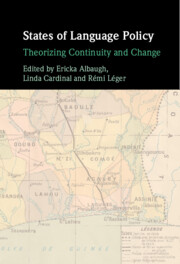Book contents
- States of Language Policy
- States of Language Policy
- Copyright page
- Contents
- Figures
- Tables
- Contributors
- Acknowledgments
- Introduction
- Part I Routes of Change
- Part II Dependent Relationships
- 7 African State Traditions and Language Regimes
- 8 Algeria’s Language Regime
- 9 Language Politics in India
- 10 Lost in Traditions? Continuity and Change in Hong Kong’s Language Regime
- Part III Levels of Governance
- Conclusion
- Index
- References
10 - Lost in Traditions? Continuity and Change in Hong Kong’s Language Regime
from Part II - Dependent Relationships
Published online by Cambridge University Press: 14 November 2024
- States of Language Policy
- States of Language Policy
- Copyright page
- Contents
- Figures
- Tables
- Contributors
- Acknowledgments
- Introduction
- Part I Routes of Change
- Part II Dependent Relationships
- 7 African State Traditions and Language Regimes
- 8 Algeria’s Language Regime
- 9 Language Politics in India
- 10 Lost in Traditions? Continuity and Change in Hong Kong’s Language Regime
- Part III Levels of Governance
- Conclusion
- Index
- References
Summary
Hong Kong’s Handover from British to Chinese sovereignty in 1997 could have brought about rapid and momentous changes to Hong Kong’s language regime. Change, however, has for the most part been incremental, and much of the British-era’s language regime remains largely intact today, including the salience of English in many domains. At the same time, language policy changes did occur, mainly through the educational policy of biliteracy and trilingualism, which added Mandarin to the de facto English-Cantonese bilingual regime. However, nearly half-way through the transition period, Mandarin use has made few notable inroads in Hong Kong society, though there are signs that this may be about to change - perhaps drastically so. This paper analyzes the evolution of Hong Kong’s language regime from its unique perspective as a city connected to the global community like few others, and located between two state traditions - one marked by pluralist, laissez-faire capitalism, and the other by Communism and totalitarian state nationalism. Overall, this case study of Hong Kong contributes to our understanding of colonial legacies, competing mobilizations, incremental change, and multilevel governance as it helps to expand the STLR framework.
- Type
- Chapter
- Information
- States of Language PolicyTheorizing Continuity and Change, pp. 190 - 206Publisher: Cambridge University PressPrint publication year: 2024

